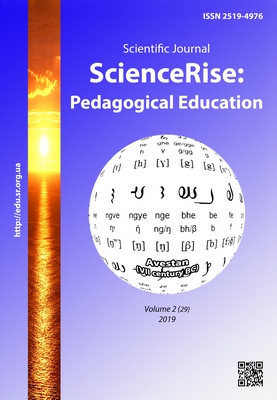The experimental testing of efficiency of forming methodology in chinese writing competence for future philologists (frontier level)
DOI:
https://doi.org/10.15587/2519-4984.2019.161481Keywords:
experiment, students, planning and course of the experiment, Chinese writing, experimental groupAbstract
Last years relations between Ukraine and the People’s Republic of China in many areas of life began to develop very quickly, which requires a large number of qualified Chinese language specialists, who could be realized in various areas of communication.
The study describes the nature of the characteristics of testing the effectiveness of the formation of the competence in Chinese writing for future philologists at the frontier level of study, as well as justifies and confirms the choice of research hypothesis. Criteria and standards for assessing the competence in Chinese writing for future philologists are indicated. For a successful experiment, a significant number of scientific papers was processed, criteria for evaluating the information, necessary to determine the level of ability to write different types and subtypes of abstracts and written communications were suggested. Methods and materials, plan and structures, as well as the duration of the experiment are described. The important point is that the publication discusses the conditions, under which the effectiveness of the methodology for the formation of the competence (as a whole) in Chinese writing for future students (level B1) will be high. Along with this, examples of tasks and the ultimate goal of their implementation were brought.
The article demonstrates the organizational and substantive aspects of the experimental teaching of students. Pre-experimental and post-experimental sections were carried out, the corresponding results of the effectiveness of the established methods of teaching Chinese writing were set forth. For a clearer perception, the results of the cuts were tabulated. An important point of the study is that, together with the demonstration of sections, the ratio of the level of student learning was illustrated
References
- Gurvich, P. B. (1980). Theory and practice of experiment in the methodology of teaching foreign languages (special course). Vladimir, 104.
- Lyakhovitsky, M. V. (2012). On the essence and specifics of an experimental study in the methodology of teaching a foreign language. Foreign languages in school. Golden pages, 8, 3–10.
- Maiier, N. (2015). Experimental verification of the effectiveness of the method of forming methodical competency of future teachers of the French language in the process of independent work. Bulletin of KNLU. Seria Pedagogy and Psychology, 24, 186–199.
- Kamenova, T. M. (2007). Methods of teaching for future managers to business written communication in English using an electronic textbook. Bulletin of KNLU. Seria “Pedagogy and Psychology”, 13, 65–74.
- Zhovnich, O. V. (2018). Methodology of teaching of professionally organized English-speaking writing communicative for future journalist with blog-technology. Kyiv, 20.
- Boretska, G. E. (2006). Methods of teaching of English written grammatically-correct communication for student-philologist. Kyiv, 22.
- Sviridyuk, V. P. (2007). Methods of teaching German writing speech of correspondence students of higher educational institutions based on the use of a distance course. Kyiv, 19.
- Konovalchuk, S. A. (2017). Methodology of integrated training of professionally oriented English-language written communication of future journalists. Kyiv, 19.
- Gorobchenko, N. V. (2006). Education of future teachers of the German written language (initial degree). Kyiv, 21.
- International Chinese teaching. Methods and Techniques for Teaching Listening and Speaking (2014). Beijing: Beijing language and culture university press, 138.
- Asadchih, O. (2017). The experimental testing of methodological system of integrated teaching of future academic Japanese philologists within master course. ScienceRise: Pedagogical Education, 6 (14), 4–9. doi: http://doi.org/10.15587/2519-4984.2017.105429
- Sidorenko, E. V. (2002). Methods of mathematical processing in psychology. Saint Petersburg: Speech, 350.
Downloads
Published
How to Cite
Issue
Section
License
Copyright (c) 2019 Oksana Asadchykh, Alla Savcheno

This work is licensed under a Creative Commons Attribution 4.0 International License.
Our journal abides by the Creative Commons CC BY copyright rights and permissions for open access journals.
Authors, who are published in this journal, agree to the following conditions:
1. The authors reserve the right to authorship of the work and pass the first publication right of this work to the journal under the terms of a Creative Commons CC BY, which allows others to freely distribute the published research with the obligatory reference to the authors of the original work and the first publication of the work in this journal.
2. The authors have the right to conclude separate supplement agreements that relate to non-exclusive work distribution in the form in which it has been published by the journal (for example, to upload the work to the online storage of the journal or publish it as part of a monograph), provided that the reference to the first publication of the work in this journal is included.







